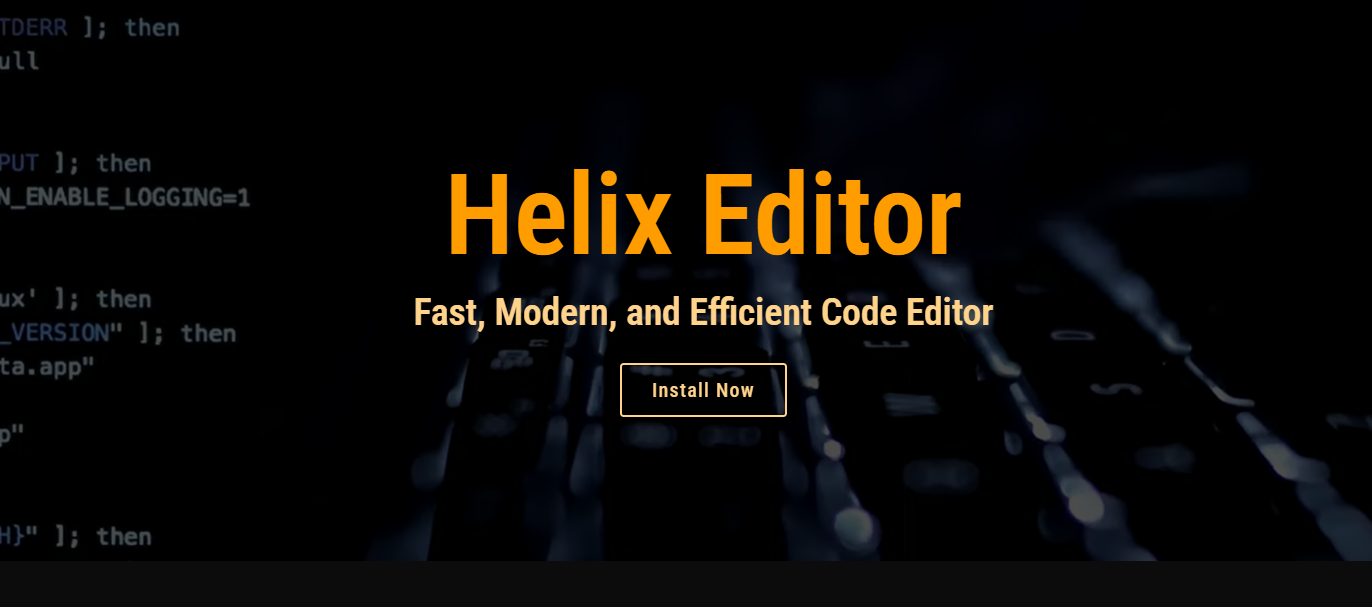Switching to a new code editor is never an easy decision, especially when you’re already comfortable with a well-established tool. Helix Editor, a fast and modern text editor written in Rust, is rapidly catching attention for its modal editing, performance, and advanced syntax support. The real question is, can it realistically replace what you’re currently using?
With features like Tree-sitter syntax parsing, multiple cursors, and deep code navigation, Helix promises a distinct developer experience. It’s tailored for those who want speed, precision, and a productive workflow without bloated interfaces. For many developers, especially those with modal editing habits, the switch might be worth considering.
But before you make the leap, it’s essential to understand how Helix stacks up. This article will walk through key comparisons, benefits, limitations, and use cases to help you decide if Helix can truly become your new go-to code editor.
Interface and User Experience
Minimal and Distraction-Free Layout
Helix Editor offers a clean and minimalist interface that avoids unnecessary clutter. Unlike traditional editors filled with tabs and sidebars, Helix focuses on the content and code you’re working on. This helps maintain concentration, especially for long coding sessions.
Modal Editing as a Core Experience
Helix uses modal editing by default, similar to Vim. It separates actions like inserting, navigating, and selecting into distinct modes. This approach might feel unfamiliar at first, but once learned, it speeds up coding dramatically by reducing hand movement.
Keyboard-Centric Workflow
Every action in Helix is mapped to intuitive keyboard commands. There’s minimal reliance on the mouse, which makes it an efficient environment for fast typists. Developers who enjoy command palettes and shortcuts will feel right at home.
Performance and Speed
Built with Rust for Efficiency
Helix Editor is written in Rust, which means it’s optimized for both speed and safety. It starts up quickly, loads large files smoothly, and handles editing tasks with minimal lag, even on lower-end machines.
Fast Syntax Parsing via Tree-sitter
Helix uses Tree-sitter for syntax highlighting and parsing, offering better precision than regex-based systems. This ensures that syntax highlighting is not just fast, but also more accurate and reliable across languages.
Resource-Friendly Usage
Helix Editor avoids bloated extensions and heavy background processes. It delivers consistent performance without eating up your RAM or CPU. Developers looking for a lightweight but powerful editor will find this very appealing.
- No Electron-based architecture
- Optimized memory usage
- Instant command execution
- Snappy navigation across large projects
- Smooth experience on minimal hardware
Coding Features and Productivity
Multiple Cursors by Default
Unlike Vim, Helix Editor includes native support for multiple cursors. This makes editing repetitive code or renaming variables in bulk a breeze. It enhances productivity while maintaining modal control.
Built-In LSP Integration
Helix offers built-in support for Language Server Protocol (LSP). This enables real-time code suggestions, linting, and navigation across many programming languages, without needing extra setup or plugins.
Advanced Code Navigation Tools
You can quickly jump to definitions, references, or symbol outlines with just a few keystrokes. Helix provides an efficient environment for managing large codebases and complex projects.
Learning Curve and Community
Adapting to Modal Logic
If you’re new to modal editing, Helix Editor can feel confusing at first. Users coming from editors like VS Code or Sublime will need time to adjust. However, clear documentation and logical command design help ease the learning curve.
Documentation and Guides
The Helix documentation is comprehensive, covering everything from basic keybindings to LSP configuration. Its official site and GitHub repo provide regular updates, FAQs, and usage tips for beginners and pros alike.
Community and Ecosystem
Helix Editor has a growing and enthusiastic community on GitHub and Discord. While it’s still younger than Vim or VS Code, its ecosystem is rapidly expanding, with contributions improving usability and feature set.
- Friendly Discord community
- Actively maintained GitHub issues
- Frequent release updates
- Documentation enriched by users
- Wiki pages and tutorials are going fast
Comparison with Popular Editors
Helix vs VS Code
VS Code is rich in extensions and UI features, but it relies on Electron, making it heavier. Helix Editor offers faster performance and cleaner operation, but lacks a GUI and plugin ecosystem at the moment.
Helix vs Vim/Neovim
Helix simplifies many things Vim users struggle with, like LSP setup or multi-cursor support. It maintains modal editing while avoiding the need for heavy configuration files, which is ideal for users who want “batteries included.”
Helix vs Sublime Text
Sublime Text is still a favorite for speed, but Helix rivals it while adding more built-in developer tools. Tree-sitter and LSP are seamlessly integrated, unlike Sublime, which often needs third-party plugins.
Should You Switch to Helix
Ideal for Keyboard-Powered Developers
If the keyboard drives your workflow and you value efficiency, Helix Editor will likely enhance your productivity. Its modal system, fast startup, and editor-focused layout offer a fluid development experience.
Best Fit for Rust and Modern Languages
Rust developers will feel especially at home, given Helix is built in Rust and tightly integrates with Rust LSP tools. But it also supports Python, JavaScript, Go, and more, making it versatile for many devs.
Consider Your Current Workflow
Helix may not have all the plugin support or GUI-based tools you rely on. It’s not a 1:1 replacement for every use case, particularly for frontend-heavy workflows or visual debugging tasks.
- Great for CLI-based devs
- Lacks GUI customization
- Limited plugin support
- Requires habit change
- Not ideal for non-modal fans
Conclusion
Helix Editor isn’t just another text editor; it’s a serious tool aimed at developers who crave speed, efficiency, and simplicity. While it may not replace your current editor overnight, it offers enough power and innovation to warrant a trial run. If modal editing fits your style and you prefer lightweight tools over complex ecosystems, Helix might just be your perfect match.







